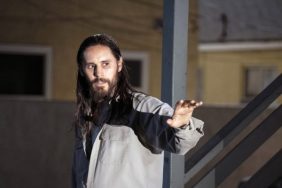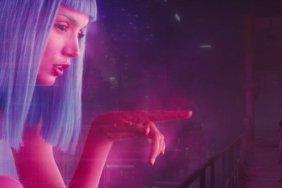Thirty-five years ago, Rutger Hauer sat on a rooftop, cradling a dove in his arms, lamenting with his robotic eyes that the wonders he had seen were about to disappear forever, because it was time to die.
It’s one of the most emotional moments in the history of science fiction. It’s also a sentiment that doesn’t quite apply to Blade Runner itself, a movie that – after the studio butchered Ridley Scott’s creative vision, leaving audiences with a film that only a cult could love – eventually took on a whole new life. Re-edited, re-released and re-evaluated, Blade Runner is now one of the most celebrated films of the 1980s, and like all celebrated films of the 1980s, the time has come to turn it into a sequel.
Thank god, then, that Blade Runner 2049 is not a cynical cash grab. Denis Villeneuve’s follow-up lovingly recreates the very particular world of Blade Runner, a future piled on top of the bones of earlier generations. It’s 30 years later in the future of this world as well, but it feels like home to fans of the original movie. The sky is just as murky, the buildings have that same beautifully unapologetic ugliness, and the line between human beings and replicants – a race of androids almost indistinguishable from their creators – has never been thinner.

Warner Bros.
Also: Interview | Denis Villeneuve on (Re)Creating the World of ‘Blade Runner 2049’
It really does feel like Denis Villeneuve pointed his camera out of the exact same window that Ridley Scott used in the original Blade Runner. The first movie asked enormous philosophical questions about the nature of humanity, but it was a tone poem first and foremost, enveloping its audience in a world where huge advancements have done nothing to curb the pervasive sense of ennui. Blade Runner 2049 captures that same aesthetic, patiently painting its pictures – courtesy of Roger Deakins, an ingenious cinematographer doing some of the finest work of his career – and letting the story unfold as it must, in its own time.
That story is simple, yet tremendously complicated. The simple version is that Ryan Gosling plays K, a man conducting an investigation that – like Deckard’s investigation in the first film – raises serious questions about the nature of human consciousness. The complex version is full of twists and turns that make you wonder what will happen next. But this isn’t a potboiler and it isn’t an action spectacle. It’s a somber meditation on what the events of this story do to K’s mind, and if you happen to be thrilled – and you almost certainly will – that’s a pleasing byproduct of a very serious story.

Warner Bros.
Ryan Gosling is given a lot to ponder, in a character who already seems to be playing a role in his own life. His introduction in the film echoes the opening of Jean-Pierre Melville’s Le Samourai, sitting in the shadows, so still you’d hardly know he was there. He’s in the world and he’s a part of it, but as he digs deeper and deeper into his assignment – oh, that would be telling – he will gradually to step outside of it and look inward, with new eyes.
Harrison Ford returns as Rick Deckard, a character who, when last we saw him, wasn’t sure if he was a human being a replicant. It would seem that the very fact that Deckard is still alive would answer that question, but a few carefully placed lines of dialogue make it difficult to know for certain. It’s nothing short of miraculous that Blade Runner 2049 assembles a whole new storyline with what’s left of the original, but still manages to leave Ridley Scott’s puzzles (mostly) unsolved.
New mysteries have been added, and the new and the old storylines conclude in ways that are emotionally satisfying, even as they raise even bigger questions about whether the artificial beings involved were simply performing their function, or if they had evolved beyond their programming. Or indeed, if the human beings involved were doing the same thing.

Warner Bros.
One picks up on little details throughout Blade Runner 2049 that imply that Denis Villeneuve and his collaborators have their own theories about what’s really happening. At least two sentences are spoken that shouldn’t be possible, but they are spoken anyway, and with those we may have our clues. But Villeneuve has built his career on providing difficult answers to simple questions, and as such, he seems to have been the perfect filmmaker for Blade Runner 2049. The film is drenched in plausible deniability, and is going to be analyzed (and overanalyzed) for a long time to come.
It’s frustrating to discuss Blade Runner 2049 now, before everyone else has seen it, for that reason. Like the original, it raises big issues and only reveals the answers in little moments you may not catch the first time around. I could reveal the plot in detail and you still wouldn’t get the full impact. But it’s the best kind of frustration, the kind that makes you want to do more research.
Whatever you feel about Blade Runner 2049, whatever you think about its philosophies, and however you choose to interpret its intentionally vague storyline, Denis Villeneuve has crafted a breathtaking return to the awe-inspiring and deeply troubled world of Blade Runner. Many films deserve to be seen. This one demands to be explored. And when you’re all done exploring, we’re going to have a lot to talk about.
Blade Runner hasn’t been lost in time, like tears in rain. Time to live.
11 Movie Sequels You’ve Probably Never Heard Of:
Top Photo: Warner Bros.
William Bibbiani (everyone calls him ‘Bibbs’) is Crave’s film content editor and critic. You can hear him every week on Canceled Too Soon and watch him on the weekly YouTube series What the Flick. Follow his rantings on Twitter at @WilliamBibbiani.
11 Movie Sequels You Probably Never Heard Of
-
The Great Escape II: The Untold Story (1988)

Christopher Reeve, Judd Hirsch and Ian McShane star in a TV movie sequel, of sorts, to the classic all-star World War II prison break drama The Great Escape. The sequel covers the escape itself as well as the events that followed. The Great Escape II: The Untold Story also features Donald Pleasance, who co-starred as one of the escapees in the original, but who - rather oddly - now plays a Nazi officer.
Photo: NBC
-
High Noon, Part II: The Return of Will Kane (1980)

The classic western High Noon gets a not-so-classic TV movie sequel, starring Lee Majors as ex-marshall Will Kane, who comes back to town and takes a stand against a corrupt lawman. High Noon, Part II: The Return of Will Kane is perhaps most notable for being written by the legendary Elmore Leonard, whose works have been adapted into beloved movies like Out of Sight, Jackie Brown and 3:10 to Yuma.
Photo: CBS
-
Kangaroo Jack: G'Day U.S.A.! (2004)

The bizarre outback crime comedy Kangaroo Jack was an unexpected smash hit, thanks in part to a misleading marketing campaign that convinced audiences it was about an animated kangaroo (which it wasn't). Kangaroo Jack: G'Day U.S.A.! came out just one year later, and doubles down on the crowd-pleasing family-friendly concept. The two mob goons from the first film return to the outback to help Jack save his family from poachers.
Photo: Warner Bros. Animation
-
The Last Days of Patton (1986)

George C. Scott earned an Oscar (which he turned down) for playing General George S. Patton in Patton, and 16 years later he returned to the role for the TV movie The Last Days of Patton. The title is accurate: the film is about Patton on his deathbed, with flashbacks to his former glory. This was no small production: Delbert Mann, the Oscar-winning director of Marty, was at the helm, and the great Eva Marie Saint plays Patton's wife, Beatrice.
Photo: CBS
-
Look What's Happened to Rosemary's Baby (1976)

Ira Levin eventually wrote a sequel to his novel Rosemary's Baby, but the TV movie Look What's Happened to Rosemary's Baby came out first. Oscar-winner Ruth Gordon returns, and Patty Duke plays Rosemary, whose antichrist offspring is now a grown man, struggling with his identity.
Photo: ABC
-
Max 2: White House Hero (2017)

The surprisingly heavy dog P.O.W. drama Max gets a cutesy, little kid-friendly sequel. In Max 2: White House Hero, Max gets called back into active duty at the White House, where he helps the first kid and his Trump-like father stop an assassination plot, declare world peace with the Russians and get the U.S. president's son and the Russian president's daughter to fall in love.
Photo: Warner Bros.
-
Mean Girls 2 (2011)

When Lindsay Lohan announced that she was trying to get a Mean Girls 2 made, everyone was a) excited, and b) forgetting that it already existed. The TV movie sequel to Mean Girls stars Meaghan Martin as the new girl at school, who gets into a feud with "The Plastics", and shenanigans once again ensue. This time there's an ipecac in a pizza. Tim Meadows, as the hapless principal, is the only original cast member to return.
Photo: ABC Family
-
A Return to Salem's Lot (1987)

Tobe Hooper's celebrated Stephen King TV mini-series Salem's Lot spawned a cheap, forgotten, but very interesting sequel in 1987. Larry Cohen co-writes and directs A Return to Salem's Lot, about town full of vampires who try to convince an anthropologist that their beliefs and way of life are just as valid as any other. It almost works, until a Nazi hunter (played by legendary filmmaker Samuel Fuller) shows up and reminds our heroes that actions speak louder than words, and that there is no excuse for oppression and murder.
Photo: Warner Bros.
-
Road House 2: Last Call (2006)

The cult classic Road House starred Patrick Swayze as Dalton, a zen badass bouncer in a tough town. The sequel, Road House 2: Last Call stars Johnathan Schaech as Dalton's son, a DEA agent investigating his father's murder and also returning home to save his uncle's bar. Schaech also co-wrote the screenplay.
Photo: Sony Pictures Home Entertainment
-
Savage Sam (1963)

Everyone has either seen Old Yeller or at least heard about how sad the ending is. But hardly anyone remembers that the sequel novel, Savage Sam, was also turned into a feature film. Tommy Kirk returns, and teams up with Old Yeller's pup, Savage Sam, to track down Apache horse thieves who kidnapped his brother and neighbor. The pulpier sequel failed to find an appreciative audience, and now the world has mostly forgotten that it ever existed.
Photo: Walt Disney
-
To Sir, with Love II (1996)

Sidney Poitier returned to his iconic role from To Sir, with Love in a TV movie, directed by the great Peter Bogdanovich no less. To Sir, with Love II finds teacher Mark Thackeray retiring to Chicago, but getting pulled back into the public school system to help troubled kids find their path.
Photo: Tri-Star Television







